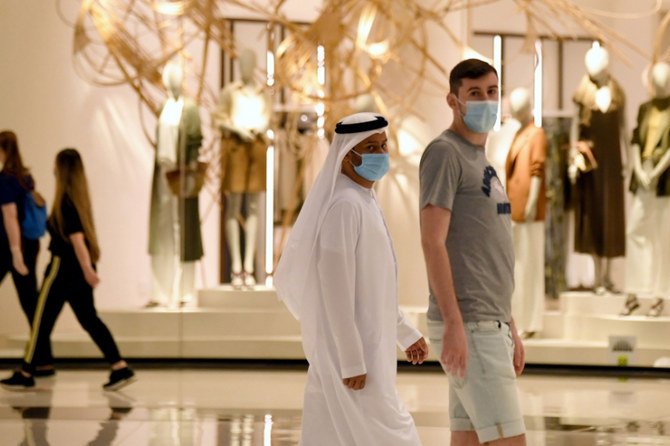DUBAI: The UAE on Monday recorded 1,027 new COVID-19 cases and three virus-related deaths.
Officials from the Ministry of Health and Prevention said the total number of cases since the pandemic began had reached 202,863. The death toll is 660.
It was also announced that 1,253 people had recovered from the virus in the past 24 hours. The total number of recoveries is 179,925.
Sheikh Mohammed bin Rashid, vice president and prime minister of the UAE and ruler of Dubai, announced the emirate would extend tourist visas to all visitors for an additional month without any government fees, given that some countries temporarily closed their airports and restricted entry and exit.
. @HHShkMohd issues directives to extend tourist visas for one additional month, without any government fees, due to temporary airport closures and entry restrictions around the world. #UAE pic.twitter.com/VyBQ1vHel6
— Dubai Media Office (@DXBMediaOffice) December 28, 2020
The decision “comes in order to make it easier for visitors from all over the world who came to Dubai to spend end-of-year holidays with their families,” state new agency WAM reported.
The statement added that all government agencies have been instructed to facilitate procedures during the coming period for visitors and tourists, to take into account all circumstances that may occur in their home countries and cooperate with all concerned authorities to ensure the comfort and safety of all visitors to the UAE.
Dubai Health Authority said that it has established three field hospitals with 49 doctors and nurses plus 10 administrative and supporting staff to offer medical care during the emirate’s new year celebrations.
.@DHA_Dubai establishes 3 field hospitals with 49 doctors and nurses & 10 admins and supporting staff to offer medical care to ensure health and safety of individuals attending #Dubai New Year’s celebrations. pic.twitter.com/wq1NUH4b6Y
— Dubai Media Office (@DXBMediaOffice) December 28, 2020
Dubai Police also announced plans to enhance safety and security for the celebrations across 23 locations.
.@DubaiPoliceHQ announces plans to enhance safety and security for New Year’s Eve Festivities as #Dubai is set to mark the New Year with celebrations across 23 locations. pic.twitter.com/7Cc7OojQdv
— Dubai Media Office (@DXBMediaOffice) December 28, 2020
Meanwhile, during daily inspection tours, Dubai Economy issued warnings to two establishments for failing to adhere to COVID-19 precautions. Inspectors found 504 other businesses to be compliant.
Abu Dhabi Sports Council said that it will resume activities for sports academies to allow children under 12 to practice individual sports while following COVID-19 protocols, which also include testing for technical staff and organizers, and installing thermal devices at entrances and training sites.
Etihad Airways said it is expanding its business with the launch of airline and charter services to offer bespoke business or leisure trips for passengers with free health insurance against COVID-19.
Amal Al-Obaidly, director of Destinations Network Planning at Etihad Aviation Group, said: “With the continuing coronavirus pandemic and its tremendous impact on the commercial aviation sector, charter flights provide a convenient option for travel to allow guests to choose the travel timing, destination and air route with flexibility.”
Elsewhere, Kuwait reported 204 new infected cases and one COVID-19 related death, raising the total to 149,857 and 932 respectively.
تعلن #وزارة_الصحة عن تأكيد إصابة 204 حالة، وتسجيل 229 حالة شفاء، و حالة وفاة واحدة جديدة بـ #فيروس_كورونا_المستجدّ COVID-19 ، ليصبح إجمالي عدد الحالات 149,857 حالة pic.twitter.com/tExOMVOdVM
— وزارة الصحة - الكويت (@KUWAIT_MOH) December 28, 2020
Oman’s Health Ministry confirmed 91 new cases, raising the total to 128,563. The death toll remains 1,495 after no deaths were reported in the previous 24 hours.
#Statement No. 254
December 28, 2020 pic.twitter.com/ZLMGxaGOAH— وزارة الصحة - عُمان (@OmaniMOH) December 28, 2020
In Bahrain, zero deaths was reported, keeping the death toll to 351, while 202 new infected cases were confirmed.
Out of 8626 COVID-19 tests carried out on 28 December 2020, 202 new cases have been detected among 99 expatriate workers, 84 new cases are contacts of active cases, and 19 are travel related. There were 187 recoveries from #COVID19, increasing total recoveries to 89643 pic.twitter.com/myUgSaTPcE
— وزارة الصحة | مملكة البحرين (@MOH_Bahrain) December 28, 2020




























